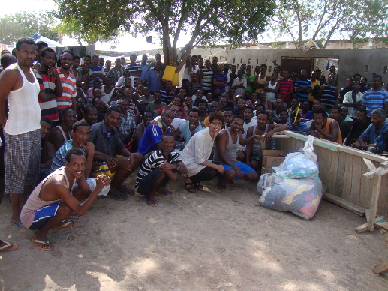Eritrean Refugees and POWs in Djibouti - 2nd Visit
Eritrean Refugees and POWs in Djibouti - 2nd Visit
Following her October 2012 visit, Elizabeth Chyrum, the Director of Human Rights Concern - Eritrea visited Djibouti between 24 March to 01 April 2013 .
Her second visit was more focused on addressing the suffering of the Eritrean refugees at Negad detention centre from Tuberculosis (TB), and other serious illnesses, and the lack of medical attention to address such dangerous and contagious diseases.
TB has been rampant at the detention centre for the last two years or more, but neither the Djiboutian government nor the UNHCR have taken the necessary actions to eradicate the diseases. Many detainees were suffering, some diagnosed as TB sufferers, but medication was not provided. They all live together, and those who were diagnosed were not separated from those who were not diagnosed. There has not been a proper TB programme for so long. Not having a proper TB assessment in such a situation is tantamount to condemning the refugees to death. At the time of Ms Chyrum's visit over 10 refugees were showing signs of TB symptoms and 7 were on medications. If a proper TB programme is launched, out of 250 detained refugees and 19 POWs, more will be identified as a carrier of the virus.
During the visit, Ms Chyrum had a meeting with the new UNHCR representative and her staff, and she was reassured by her that they would introduce a TB programme very soon. A visit by a Medical Doctor and a UNHCR advisor was conducted just before Ms Chyrum's visit, but the report of the visit was not available at the time of the meeting. Due to the detention condition any other private medical care arrangement has not been possible.
Ms Chyrum met with Mr Ibrahim Rayaleh, Secretaire Executive of ONARS, a national organization that assists refugees, and raised her concern about the situation of Eritrean refugees at Negad prison.
Ms Chyrum also met with Mr Abdulkader Kamil (the then Defence Minster), Mr Hassan Said Kaireh (Chief of the national security); General Zekaria Cheikh Ibrahim; General Hassan Ali Kamil; and other senior officers and advisors to discuss the plight of the Eritrean refugees -some of whom have been detained for up to five years, the lack of a TB programme in prison, lack of medical care for all the other illnesses the detainees are suffering from, and to request for their release or transfer to refugee camps as they have not committed any crime except coming to Djibouti to seek asylum.
The detainees are mostly deserters from the enforced military conscription in Eritrea. However, because there is a border dispute between Eritrea and Djibouti, and these refugees have military
training, they are treated as a security risk. There were nine families (husbands, wives and some with children). These families are separated. The wives and the children are at the refugee camp (Ali Addeh), and the husbands are detained incommunicado at Negad prison.
After the meeting, Ms Chyrum was told that the 250 detainees at Negad prison will not be released while in Djibouti. There were 20 Prisoners of War (POW)who were captured during the border
war between Djibouti and Eritrea in 2008. One of them died due to the wound he sustained. One has become mentally ill but receives no medication nor treatment and still lives with the other 18 POWs at Negad prison. Ms Chyrum requested the release of those POWs as Eritrea has not asked for them and they have been in detention for nearly 5 years. The Djiboutian authorities firmly declined the request. The reason is that they have POWs of their own in Eritrea and they would like to exchange them with those they captured.
The POWs have nothing to do during the day. They receive no education, no employment, nothing to help them pass the time usefully. They are only allowed to sit and wait, in health-threatening boredom, to be liberated. For how long....? . This also applies to the 248 refugees.
The priority for the Eritrean refugees is to be free from TB and other illnesses they are suffering from. The UNHCR and the Djiboutian government have promised to deal with this serious problem by putting a TB programme in place and allowing those who suffer from other illnesses to get proper treatment.
The 248 Eritrean refugees have to be resettled to a third country. The USA has been the major country providing resettlement to the Eritrean detainees in Negad detention centre.
Although the Djiboutian government have asked the UNHCR to resettle all the refugees from Negad prison, the UNHCR told Ms Chyrum that they are not able to do so. In fact they say some from the group will never be resettled. If the UNHCR will not find a safe haven for these refugees, and the Djiboutian government is not willing to release them, how long are they going to be detained at Negad prison?
These refugees have not committed any crime. They fled persecution in their country and came to Djibouti to seek refuge. It is not their fault that they had military training. National Service is compulsory to men and women in Eritrea. What choice do they have? They are subjected to indefinite national service/forced labour and slavery, and they are locked up and left to rot in the host countries like Djibouti. They are detained out of a misplaced fear - none of the Eritrean refugees were caught doing anything to harm the host country.
Ms Chyrum was authorised to visit the refugees and POWs at Negad prison on 31/03/13, a day before she concluded her visit.

A group of 176 Eritrean detained refugees in Djibouti
A group of 74 Eritrean refugees detained at Negad prison.
N.B: The above pictured refugees are kept in two groups, and they do not see each other.
{jcomments off}


![[AIM] Asmarino Independent Media](/images/logo/ailogo.png)
